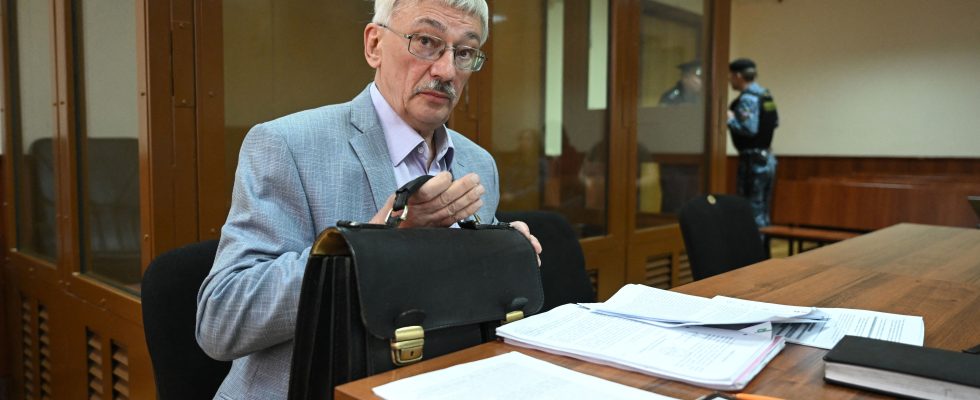It is an emblematic lawsuit. Co-winner of the 2022 Nobel Peace Prize, Oleg Orlov, 70, is one of the leaders of Memorial, an internationally respected NGO, born after the fall of the USSR, which worked on the memory of the abuses of Stalinism. The NGO was permanently banned in December 2021. Accused of breaking the law by expressing his opposition to the war, Oleg Orlov faces three years in prison. In Moscow, he recounts his current trial which, in the Soviet tradition, is akin to a parody of justice.
L’Express: Your trial seems to be a foregone conclusion. However, you defend yourself by playing the game of justice, as if it were just and fair…
Oleg Orlov: In Russia, we have not yet reached the stage of “closed” trials, without a court hearing, as under Stalin. But the fact is that the trials behind closed doors are increasing, as in the case of the opponent Vladimir Kara-Mourza. I thought mine would also be held behind closed doors, but that’s not the case. There have already been three hearings, all of which have felt like theater moments. My lawyers and I, however, decided to play the game. Since there is a trial, we might as well turn this moment into an interesting show. Our objective: to show what the accusations are worth, how they were falsified; reveal the true face of the “experts” produced by the prosecution.
Precisely, in many trials, the reports of these famous “experts” play a crucial role…
For them, what counts is not their demonstration but the conclusion: “Yes, Orlov has discredited the army”. The funny thing is that I don’t contradict them: yes, I discredited the army! The problem is that they claim to be experts, scientists. However, they are unable to employ expert methods. One of them is a mathematics teacher and has to carry out… a linguistic expertise! Another is a translator, but not a specialist in linguistic research. And yet, these people write expert opinions. We took these at face value and hired serious researchers: real experts, who assessed their expertise! They help us ask the right questions. Last time, we interviewed their pseudo-expert for 1.5 hours. At the end, she was almost in tears. One would pity these kinds of characters if people were not in prison because of them.
Do Russian judges believe their decisions themselves?
It depends on the lawsuits. Some judges behave like robots and do not hide their hostility towards the defendants. During the trial, they behave like prosecutors. But most of the time, the judges seem to act professionally. My judge, for example, shows a real interest in what’s going on. She is attentive to our interrogations, does not prevent us from asking questions and intervenes in the debates in a relevant way. I don’t know what verdict she will give for me, but in Russia it is not uncommon to come across judges who behave in an ideal way. Some even require the prosecutor to provide correct evidence, to the point that it sometimes feels like an acquittal is near. Then, the judge disappears into the chamber of deliberations and there, he turns into a robot and renders an absolutely unfair verdict. This scenario is often repeated: the more the judge is correct, the more he respects the standards of the law, the more his verdict will be harsh and contrary to the law.
How to explain this attitude?
Russia does not have a judicial system worthy of the name. There is reason to pity these judges who are not supposed to behave like robots. They are people of law. Deep in their soul, everyone understands the absurdity of these accusations as well as their anti-legal nature. But they have superiors and understand that if they pronounce an acquittal, they will no longer be able to practice their profession. Worse, they may be punished, for whatever reasons. So they are afraid, and see themselves as a cog in the great machine of the state. There is no independent justice; in any case within the framework of political affairs which concern the State.
So you don’t expect to win your case?
Neither I nor my lawyers have any illusions. We are fighting, not for my acquittal – although we demand my acquittal – but for the light to be shed on the absurdity of what is happening here.
How would you define Russia today?
The right word is dictatorship. The slightest alternative thought is suppressed, crushed. There is no possibility of opposing a dictator, not only for the opposition but also within the so-called elite. The state in which Russia finds itself today did not appear overnight. We descended this slope gradually, for many years. This slow decline started when Putin returned to power after Medvedev in 2012. Then there was Ukraine’s first aggression in 2014, and that’s when it all really went downhill.
It continued. The repression grew little by little. Each demonstration ended with mass arrests, thousands of people arrested. Administrative arrests have been followed by criminal cases. But the most brutal deterioration began with the invasion of Ukraine on February 24, 2022, when extremely repressive laws were passed. It is easy to understand why: despite all these years of repression, a very important anti-war movement emerged, from the first days of the war.
